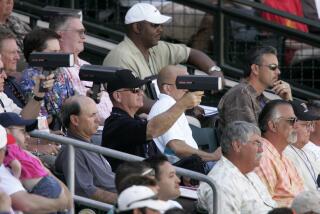Ousted Scouts Testify in Court : Litigation: The Randall brothers said they were in the Cubs for almost three years before their position on religion was known.
- Share via
SANTA ANA — Twin boys from Anaheim Hills who allege that the Boys Scouts of America ousted them over their refusal to swear an oath to God testified Wednesday that they were Scouts for nearly three years before their position on religion caused a problem.
“I never said the word God in the (Cub Scout) Promise,” said 10-year-old William Randall. “I just mouthed it. . . . Me and my brother don’t believe in God.”
William and his brother, Michael, who took non-religious oaths to tell the truth in court, said their Cub Scout den leader in Culver City didn’t object to their views on God. They said they only ran into trouble when they moved to Anaheim Hills and transferred into a new den.
The Randalls contend in their lawsuit that Scouting officials in Orange County labeled them atheists and expelled them from the organization. They filed suit last February, charging the 80-year-old Scouting institution with religious discrimination. The boys are seeking to be reinstated into Cub Scout Den 4, Pack 519 in Anaheim.
“All William and Michael Randall are seeking today from this court is the opportunity to put those uniforms back on,” James Grafton Randall, the boys’ father and attorney, said during his opening statement.
The Randalls’ lawsuit is one of several high-profile cases alleging that the Boys Scouts of America illegally discriminates against girls, atheists and homosexuals. In a Chicago case, a judge is expected to rule soon on whether an 8-year-old boy can be barred from the organization because he is an atheist.
As the Randalls’ trial opened Wednesday amid a crush of reporters and spectators, the attorney for the Orange County Council of the Boy Scouts of America said that the boys were never thrown out of Scouting--they were only told that they could not advance in rank because of their non-beliefs.
George Davidson, the Boy Scouts’ attorney, said in his opening statements in the non-jury trial that the boys and their parents had signed Scouting forms indicating that the religious requirement was fulfilled during the boys’ first three years in the Cub Scouts.
He said the boys later chose to march to the “beat of a different drummer” and ignore the fundamental “duty-to-God” principle of Scouting.
Allowing the Randall boys’ views in the Cub Scouts “would devalue Scouting’s message and interfere with the goal of all the other parents who want the duty-to-God and other values instilled in their sons,” Davidson said.
“By what authority do the Randalls claim to force this disruption on other families?” he asked.
James Randall responded that the authority can be found under the Unruh Civil Rights Act, a state law that prohibits businesses from discriminating against a person on the basis of race, sex, age or religious beliefs.
He argued that the Boy Scouts of America is not a private association, as it claims, but a public business that advertises, meets in public schools, is federally chartered and is not selective in choosing its members.
Further, Randall said, the Boy Scouts’ own literature requires that “all boys” be allowed to join the organization. And, as far as the Boy Scouts’ religious principles, Randall contended that “the defendant does not define God and does not seem to mind if the word God means a tree, a rock, some supreme being or a Milky Way bar.”
The Randall boys, who sat at the council table with their father, played with Ninja Turtle figures and race cars during the court recesses but were attentive during the proceedings. After the attorneys’ opening statements, first William, then Michael, took the witness stand.
Dressed in similar gray pants and shirts, the identical twins answered questions clearly and loudly. Both testified that they have refused to say the word God for as long as they could remember.
In the first grade, they testified, they would not say part of the Pledge of Allegiance because of the reference to God.
“If I don’t believe in a supreme being . . . then I don’t want to say the word God ,” Michael said.
The young Randalls testified fondly about their memories of being Cub Scouts, when they would go camping, win merit badges and participate in the “Pinewood Derby” races.
“I got a gold medal for the fastest car in the pack,” said Michael as he proudly held up his award.
For their school pictures, they both wore their Cub Scout uniforms. “I was proud of my uniform,” William said. Michael said he and his brother “miss” Scouting a great deal and want to be let back in on their own terms.
Being a Cub Scout is the one thing they both have on their Christmas lists, Michael noted.
When asked by Davidson on cross-examination if he believes in Santa Claus, Michael smiled and said: “Yes.”
But Davidson dug deeper into the boys’ religious beliefs, interrogating them about what faiths they had knowledge of, whether their parents had had any influence on their beliefs, and questioning their values.
When the attorney asked Michael why he thought it was wrong to lie, the youth responded that “you can get into serious trouble.” He said it was best to tell the truth, “like George Washington did when he chopped down the cherry tree.”
However, when Davidson asked the boys to describe characteristics of several religious faiths, they seemed confused and unable to answer.
“I guess I goofed up a little,” said William after he tried to define Judaism.
Later, Davidson asked: “Did your parents tell you whether they believe in God?”
“Yes,” responded Michael. “They said that they believe in God, but they want me and my brother to grow and pick our own religion.”
More to Read
Sign up for Essential California
The most important California stories and recommendations in your inbox every morning.
You may occasionally receive promotional content from the Los Angeles Times.













